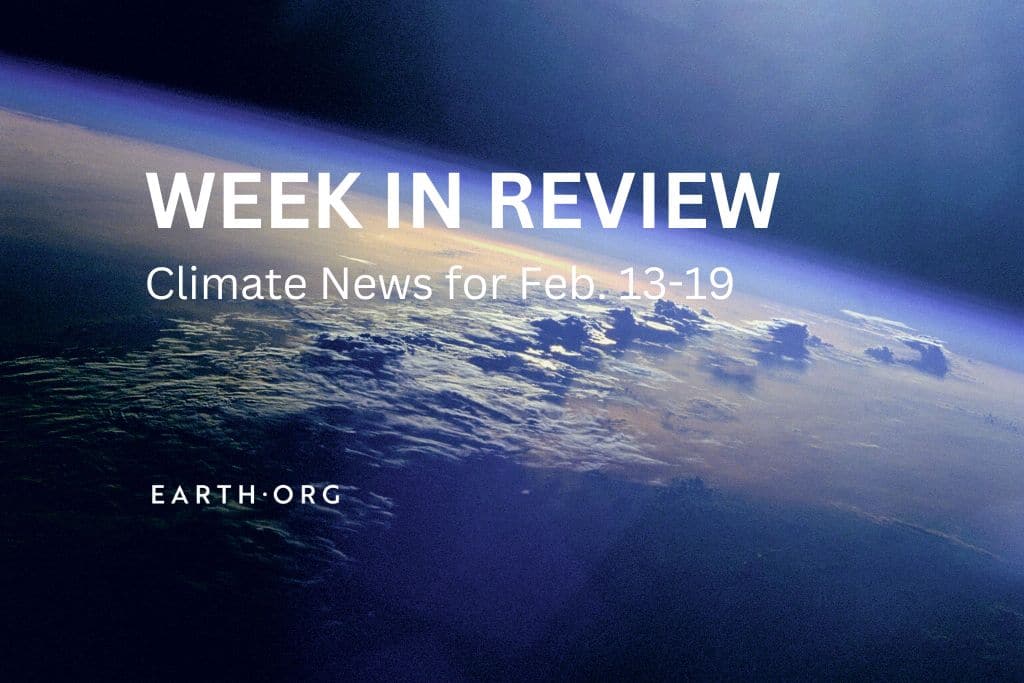This weekly round-up brings you key climate news from the past seven days, including key takeaways from Guterres’ speech at the UN Security Council, the new EU-wide ban on sales of gas-powered cars, and a new research on the environmental footprint of animal feed.
—
1. ClientEarth Sues Shell Board Over ‘Flawed’ Risk Management Strategy In World First Climate Lawsuit
ClientEarth has filed a legal claim in the UK against 11 Shell directors, accusing them of endangering the company’s future by failing to prepare for the “material and foreseeable” climate change risk in the first-of-its-kind climate lawsuit.
The non-profit environmental law charity is asking the high court to order Shell’s directors to develop a climate risk-management strategy that is in line with 2021’s high-profile legal case, which saw a Dutch court order the company to cut its emissions by 45% by 2030 compared with 2019 levels.
Read more here.
2. Sea Level Rise Could Trigger ‘Mass Exodus on a Biblical Scale’, UN Chief Warns
Accelerating sea level rise could displace one in every 10 people on the planet, triggering massive economic, social, and cultural disruptions worldwide, UN Secretary-General António Guterres told the UN Security Council on Tuesday. He described the predicted dislocation of nearly 900 million people living in low-lying coastal areas as a “mass exodus of entire populations on a biblical scale” that would drive “ever-fiercer competition for fresh water, land and other resources.”
Today, sea levels are rising more than twice as quickly as they did for most of the 20th century due to increasing Earth temperatures.
Read more here.
3. EU Approves Ban on Sales of Gas-Powered Cars by 2035, Sets Weaker Emission-Reduction Targets for Trucks and Buses
The new law sets the path toward zero emissions by introducing a ban on new petrol and diesel car sales from 2035, with intermediate emissions reduction targets for 2030 set at 55% for cars and 50% for vans.
The European Commission also advanced tougher CO2 emission-reduction targets for heavy vehicles, requiring new trucks to cut emissions by 90% by 2040 and all new city buses to be carbon neutral from 2030. Intermediary targets are set at 45% by 2030 and 56% by 2035. The proposal disappointed campaigners, who warn that CO2-emitting trucks registered in 2040 would still be on the road well after 2050, the year in which the bloc is expected to effectively achieve net-zero emissions.
Read more here.
4. Salmon and Chicken Footprint Stems Mostly From Feed: Study
Salmon and chicken footprint derives mainly from the food these animals are reared on, a new study suggests. Following an analysis of the effects of farming on global emissions, spatial disturbance, nutrient pollution, and freshwater use, researchers concluded that feed accounts for at least 78% and 69% of the environmental pressure stemming from farmed salmon and broiler chickens, two of the largest animal-sourced food sectors.
“Food is one of the biggest environmental pressures to the planet and we’re all trying to be more conscious about what we’re eating,” the study’s lead author, Dr. Caitie Kuempel, said. “Anything that requires feed is going to have a higher environmental footprint than things that are not fed.”
Read more here.
5. Rapid Melting of Antarctica’s Doomsday Glacier ‘Very Concerning’: Study
West Antarctica’s Thwaites Glacier – nicknamed the “Doomsday Glacier” because of the catastrophic impact of its potential collapse on sea levels – is melting rapidly and in unexpected ways, new research found.
A team of 13 scientists led by Britney Schmidt, associate professor at Cornell University, spent nearly two months on the glacier in late 2019 and early 2020. They found that warm water is seeping into the glacier’s crevasses and other openings known as terraces, threatening its demise and a significant rise in sea levels. Indeed, alterations in the grounding line can result in very rapid and potentially catastrophic changes in glacier and ice-shelf behaviour.
At 80 miles across, Thwaites is the widest glacier in the world – roughly the size of Florida. Its collapse represents more than half a metre (about 1.6 feet) of global sea level rise potential but scientists warn that it could also destabilise neighbouring glaciers, leading to a further three-metre (9.8-foot) rise.
Read more here.

















